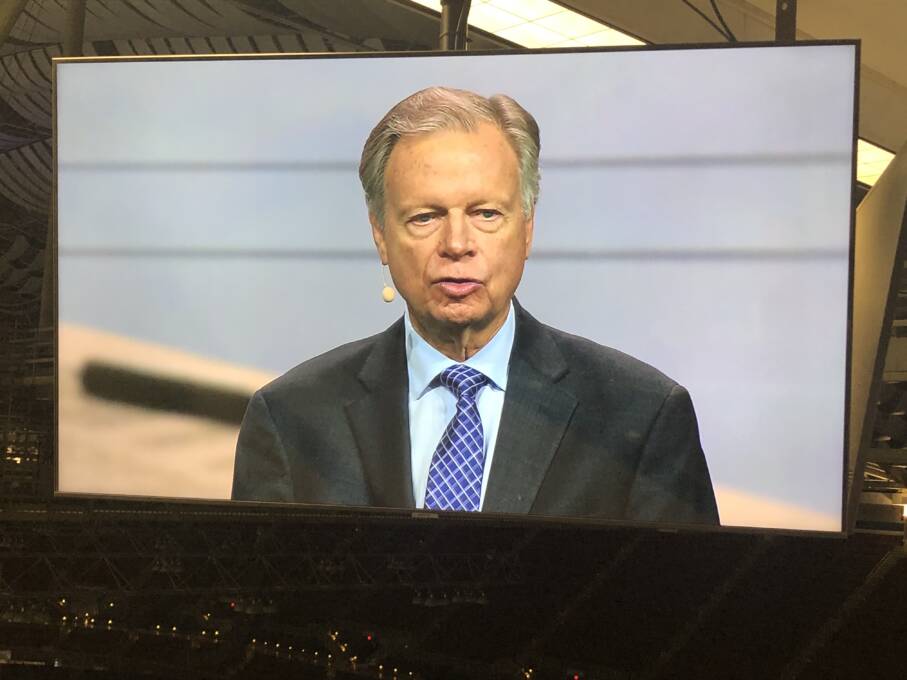
Pictured: Stephen Bohr and Björn Karlman By Björn Karlman | 9 July 2025 | Sitting in the nosebleed seats of the America’s Center convention center—AKA the assigned General Conference Session “external media” area—I found myself next to a new friend whose publication sits firmly on the ultra-conservative wing of Adventism. We laughed about how we […] Source: https://atoday.org/finding-common-ground-in-the-nosebleeds/



 July 8, 2025
July 8, 2025 Adventist News Network
Adventist News Network GCSession 2025 – Special Report: Day 6
GCSession 2025 – Special Report: Day 6 Focus on Elections
Focus on Elections Exploring the Exhibition Halls
Exploring the Exhibition Halls The Dining Hall
The Dining Hall Media Ministry Booths
Media Ministry Booths Holistic Health Displays
Holistic Health Displays Reports from ECD, UUC, and SPD
Reports from ECD, UUC, and SPD Membership statistics
Membership statistics Regional challenges
Regional challenges Mission efforts and community engagement
Mission efforts and community engagement Evening Program:
Evening Program: Youth outreach initiatives
Youth outreach initiatives “Let’s Pray” – prayer initiative
“Let’s Pray” – prayer initiative Musical contributions in the main session
Musical contributions in the main session Stay tuned!
Stay tuned! July 8, 2025
July 8, 2025 Adventist News Network
Adventist News Network ECD – East-Central Africa Division
ECD – East-Central Africa Division Welcome to the East-Central Africa Division (ECD)
Welcome to the East-Central Africa Division (ECD) This division includes 12 countries, with 6 located in the 10/40 Window – a region with great missionary needs.
This division includes 12 countries, with 6 located in the 10/40 Window – a region with great missionary needs. The ECD has over 5.7 million members, including
The ECD has over 5.7 million members, including 1 million baptisms in the past 5 years
1 million baptisms in the past 5 years The goal: to turn spectators into active disciples and disciple-makers
The goal: to turn spectators into active disciples and disciple-makers Through the initiative ECD Evangelistic Impact 2025
Through the initiative ECD Evangelistic Impact 2025 Learn more about the church’s work in this region:
Learn more about the church’s work in this region: 
 Stay tuned!
Stay tuned!
 July 8, 2025
July 8, 2025 Adventist News Network
Adventist News Network UUC – Ukrainian Union Conference
UUC – Ukrainian Union Conference Welcome to the Ukrainian Union Conference (UUC)
Welcome to the Ukrainian Union Conference (UUC) Clothing
Clothing Food
Food Essential supplies
Essential supplies And most importantly: a message of hope
And most importantly: a message of hope The church remains committed to meeting both physical and spiritual needs.
The church remains committed to meeting both physical and spiritual needs. Learn more about the church’s work in Ukraine here:
Learn more about the church’s work in Ukraine here: 
 Stay tuned!
Stay tuned!
 July 8, 2025
July 8, 2025 Adventist News Network
Adventist News Network SPD – South Pacific Division
SPD – South Pacific Division Welcome to the South Pacific Division (SPD)!
Welcome to the South Pacific Division (SPD)! Australia
Australia New Zealand
New Zealand Papua New Guinea
Papua New Guinea Numerous islands throughout the South Pacific
Numerous islands throughout the South Pacific The SPD shares the message of the Bible through:
The SPD shares the message of the Bible through: Evangelistic campaigns in Papua New Guinea
Evangelistic campaigns in Papua New Guinea Church planting on various islands
Church planting on various islands Use of modern communication tools
Use of modern communication tools Many people in this region have come to know faith and hope through the work of the church.
Many people in this region have come to know faith and hope through the work of the church. Learn more about the SPD here:
Learn more about the SPD here: 
 Stay tuned!
Stay tuned!